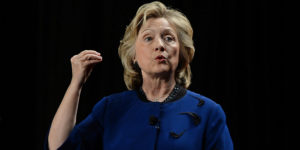
For it is on the key questions of wealth inequality and economic injustice that most Black voters will be focusing their gaze when it’s time to pull the lever next November, current trends suggest.
Black voters put jobs and the economy at the top of their list of most important issues in virtually every recent poll. It is the most predominant concern in Black households from the lowest income to the upper reaches of the middle class. For a community that was eviscerated by the Great Recession and consistently suffers unemployment numbers double the national average, Clinton will need more than nostalgia to not only garner Black support but to get Black people to the polls in numbers rivaling Barack Obama’s.
Political strategist Charles Ellison suggested in a piece on The Root that Clinton will need to win at least 90 percent of the Black vote in order to win the White House. For perspective, consider that Obama got 95 percent in 2008 and 93 percent in 2012.
Clinton has massive amounts of good will in the Black community—positive feelings flowing from her husband, President Clinton, and also good vibrations emanating from Clinton herself. As a U.S. Senator and as Secretary of State, she could always be counted on to consistently side with most Black folks on important political issues. In addition, she and Obama got beyond their rocky start to become close political allies, perhaps even good friends.
Asked about Clinton over the weekend while in Panama, the president—while stepping somewhat gingerly around the subject because she hadn’t yet announced her candidacy—said Clinton “was a formidable candidate in 2008, she was a great supporter of mine in the general election, she was an outstanding secretary of state, she is my friend.”
“I think she would be an excellent president,” he said.
Reporters wanted more, though, so Obama obliged.
“The one thing I can say is, she’s going to be able to handle herself very well in any conversation or debates around foreign policy,” he said. “And her track record with respect to domestic policies is I think one that cares about working families. If she decides to run and she makes an announcement, she’s going to have some strong messages to deliver.”
However, while Clinton’s Black support will surely remain high throughout the campaign—unless she makes some sort of massive gaffe that the former Secretary of State is unlikely to make—there is a key question that will need to be answered: Can she get Black folks excited about her candidacy? In other words, can she come close to pulling off an Obama—who scored an historic first by getting Black people to vote in a higher percentage than did white people?
And for that, she’s going to need more than an endorsement from President Obama or President Clinton. She’s going to need to talk in a substantive and persistent way about how she plans on adopting policies that will have a major impact on the economic fortunes of the Black community. (Ahem, the kind of stuff Massachusetts Sen. Elizabeth Warren talks about.) It’s not enough to talk in vague terms about the “middle class,” using that as a proxy for every group under the sun. No, the words “Black” and “African American” will need to pass through her lips. On a regular basis. For the next 18 months.
We will be watching and listening. . . closely.


